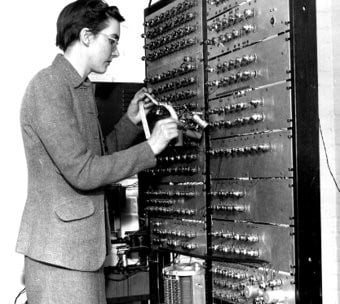Builder and programmer of the ARC and SEC turned 100 this year
Obituary Professor Kathleen Booth, one of the last of the early British computing pioneers, has died. She was 100.
Kathleen Hylda Valerie Britten was born in Worcestershire, England, on July 9, 1922. During the Second World War, she studied at Royal Holloway, University of London, where she got a BSc in mathematics in 1944. After graduating, she became a junior scientific officer at the Royal Aircraft Establishment, a research organization in Farnborough. Two years later she moved to Birkbeck College, first as a research assistant, and later a lecturer and then research fellow.
She also worked at the British Rubber Producers' Research Association (BRPRA), where she met and worked with mathematician and physicist Andrew Donald Booth, who later became her husband. After studying with X-ray crystallographer Professor J D Bernal - inventor of the Bernal Sphere - A D Booth was working out crystal structures using X-ray diffraction data, and finding the manual calculations very tedious; he built an analog computer to automate part of this.

Kathleen Booth at work
In 1946, Britten and Booth collaborated at Birkbeck on a very early digital computer, the Automatic Relay Calculator (ARC), and in doing so founded what is now Birkbeck's Department of Computer Science and Information Systems.
The ARC was constructed in Welwyn Garden City, close to the BRPRA's headquarters. A D Booth designed it, but Kathleen Britten and her fellow research assistant Xenia Sweeting built the hardware. Bernal obtained funding from the Rockefeller Foundation for Booth and Britten to visit the Institute for Advanced Study located in Princeton, NJ, where Booth reported that only Bernal's friend John von Neumann gave them any time. Von Neumann explained his concept of what is now called the von Neumann computer architecture.
- RIP Katherine Johnson: The extraordinary NASA mathematician astronauts trusted over computers
- Farewell to two pivotal figures: The founder of Inmos, and the co-creator of MIME
- RIP: Creators of the GIF and TRS-80
- Mary Coombs, first woman commercial programmer, dies at 93
Booth and Britten returned to the UK and redesigned their calculator based around these ideas, leading to the ARC2 and in the process inventing the first drum memory to provide enough storage to hold both program information and data. Building the ARC2 from relays proved too much, so in 1948, Booth and Britten moved on to the Simple Electronic Computer (SEC) and then the All Purpose Electronic X-Ray Computer or APE(X)C. You can try out the APE(X)C in the MESS emulator.
The APE(X)C design was commercialized and sold as the HEC by the British Tabulating Machine Co Ltd, which eventually became ICL. A video about the HEC1 is below.
In 1950, Kathleen and Andrew married, the same year that she got a PhD in applied mathematics, again from the University of London. To secure further funding for their work, the Booths again went to the Rockefeller Foundation, which provided it on condition that the APE(C)X worked with human languages as well as just mathematics. The result was a demonstration of machine translation in November 1955.
As well as building the hardware for the first machines, she wrote all the software for the ARC2 and SEC machines, in the process inventing what she called Contracted Notation. This language, through evolution and contributions by others, is today known as assembly language.
She also discusses synchronous versus asynchronous operation in the paper linked at the bottom of this article. Her 1958 book, Programming for an Automatic Digital Calculator, was one of the first on programming written by a woman.
The same year, she started working with neural networks, also the subject of her last paper, "Using neural nets to identify marine mammals", co-written with her son Dr Ian J M Booth and published in 1993.
The Booth family moved to Canada in the early 1960s, where Kathleen and Andrew continued working in academia; she retired in the late 1970s.
Kathleen Booth died September 29, 2022, and is survived by a daughter as well as her son.